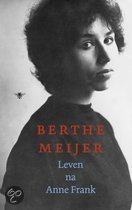 Holocaust survivor Berthe Meijer, who was liberated from Bergen-Belsen at the age of seven, remembers Anne Frank as an inspired storyteller who tried to boost the spirits of the camp's youngest prisoners with fairy tales about about princes and elves as the shadow of death waited nearby. Meijer's memoir, Life After Anne Frank, is set to be published in Dutch this month; its version of Anne Frank's final weeks has already attracted some skepticism from a number of people involved with Anne Frank's story.
Holocaust survivor Berthe Meijer, who was liberated from Bergen-Belsen at the age of seven, remembers Anne Frank as an inspired storyteller who tried to boost the spirits of the camp's youngest prisoners with fairy tales about about princes and elves as the shadow of death waited nearby. Meijer's memoir, Life After Anne Frank, is set to be published in Dutch this month; its version of Anne Frank's final weeks has already attracted some skepticism from a number of people involved with Anne Frank's story. The Unconvinced
-- Historian David Barnouw, who contributed to the academic Critical Edition of Anne Frank's diary, dismisses Meijer's account on the grounds that "it would be an amazing coincidence that Meijer would have a memory about someone who only became well known many years later." And that, already mortally ill with typhus, Anne Frank was probably in no shape for entertaining children -- an objection also raised by Hanneli Goslar, one of Anne Frank's closest friends and one of the last people to see her alive at Belsen: "In that condition, you almost died... You had no strength to tell stories."
-- The Dutch filmmaker Willy Lindwer didn't include Meijer in his documentary The Last Seven Months of Anne Frank, which features interviews with several women who knew Anne Frank in the camps, because he found her testimony too vague to be credible: "Berthe... had not more than a very vague recollection of this concentration camp," he said in an emailed message to the Associated Press. “She recalled the image of an older girl who told stories to younger children. It may have been Anne Frank, but also maybe not. Very vague.”
On the other hand...
-- Records obtained by the Associated Press from Yad Vashem, Israel's Holocaust documentation authority, prove that Berthe Meijer was indeed a prisoner at Bergen-Belsen for 13 months -- including the time Anne Frank was held at the camp -- until liberation in the spring of 1945.
-- Meijer says she and her family knew the Franks before they went into hiding: they were all German-Jewish refugees living in the same South Amsterdam neighborhood, with Berthe's family living on Niersstraat, where Anne Frank attended the Sixth Public Montessori School.
-- The Anne Frank House itself stands by the claims made in Meijer's memoir. A spokesperson for the institution says that Meijer has already been interviewed by a number of museum historians about her memories of Anne Frank, and they have no cause to doubt her recollections -- "It could very well be true."
Of course it could. But what to make of all this?
I'm certain that, whatever really went down at Bergen-Belsen, Berthe Meijer isn't deliberately misleading people in order to sell books. There are a few notoriously fraudulent Holocaust memoirs out there, to be sure -- Wilkomirski's Fragments and that book about a girl who survived the Holocaust by living with a pack of wolves come to mind -- but their authors had no experience whatsoever with the subjects they wrote about. Meijers is a documented survivor, someone who endured the hell of Belsen at a young age and presumably understands the gravity of her past well enough to avoid lying about it. Maybe she really does believe Anne Frank told her stories there, but this is impossible to verify, and I wouldn't be surprised if it didn't happen at all. In the end, we'll probably never know one way or another.

This a book I would never buy because it might not be true. Its just making money with Anne´s name :(
ReplyDeleteI truly hope that isn't the case. :(
ReplyDeleteI think Meijer does believe she knew Anne Frank in Belsen, but that doesn't mean it really happened. My concern about this episode is that if her memories of Anne in Belsen turn out to be false, then her well-meaning book will become another weapon Holocaust deniers use to "prove" that Anne's story is a fraud.